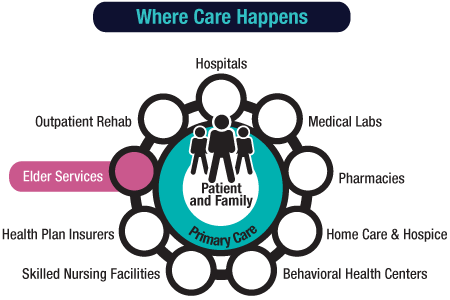
Careers in Elder Services
As the population ages, elder care is increasingly being delivered in home and community settings. Services now extend far beyond traditional nursing homes and are designed to meet a wide spectrum of needs, from personal support to medical care. These services prioritize independence, dignity, and quality of life, while also supporting caregivers and families.
A Diverse Range of Elder Care Settings
Older adults receive care in a variety of environments depending on their physical, emotional, and social needs. These settings may include:
- In-Home Care – Non-medical and medical care delivered in the home to support daily living and health needs.
- Adult Day Health Programs – Structured programs offering social activities, meals, supervision, and clinical care during daytime hours.
- Nursing Facilities – Residential care settings offering 24-hour skilled nursing and rehabilitative services.
- Memory Care Centers – Facilities specializing in care for individuals with Alzheimer’s disease and other forms of dementia.
- Assisted Living Residences – Housing that offers supportive services while promoting independence.
- Short-Term Rehabilitation Centers – For recovery following surgery, injury, or hospitalization.
The Shift Toward “Aging in Place”
In recent years, there has been a strong shift toward “aging in place”—the concept of enabling older adults to remain in their homes or community-based settings for as long as safely possible. This shift is reshaping how elder care is structured and delivered.
- Nearly 79% of individuals who require long-term services and supports now receive them at home or in community-based settings.
- This model places greater emphasis on preventive care, personal support services, and the involvement of family caregivers and home health professionals.
The Role of Aging Services Access Points (ASAPs)
Throughout Massachusetts, Aging Services Access Points (ASAPs) function as regional hubs that connect older adults and their families to a full range of elder care services. ASAPs provide:
- Care assessments and referrals
- In-home support services
- Case management and care coordination
- Nutrition, transportation, and caregiver support
ASAPs serve as “one-stop” entry points for navigating the aging services system, whether for temporary assistance or long-term care planning.
What It’s Like to Work in Elder Services
Working in elder care is both rewarding and multifaceted. Professionals and paraprofessionals in this field often form deep and meaningful relationships with those they serve. The focus is not only on physical health but also emotional well-being, social connection, and dignity in aging.
Responsibilities may include:
- Assisting with personal care such as bathing, grooming, and mobility
- Monitoring medications and vital signs
- Transporting clients to appointments or community activities
- Maintaining accurate records and communicating changes in health status
- Supporting family caregivers and coordinating additional services
Because elder services span a broad spectrum of needs, the field requires a diverse and flexible workforce.
Career Opportunities in Home and Community-Based Elder Services
Elder care careers range from entry-level roles to licensed clinical positions and case management. Opportunities exist in both nonprofit agencies and private home care companies, and many positions offer flexible hours and opportunities for advancement.
Common roles include:
Personal Care Attendants (PCAs)
Provide non-medical assistance with daily activities in the client’s home. This is often an entry point into healthcare for those without formal clinical training.
Home Health Aides (HHAs)
Assist with personal care and some clinical tasks under supervision. HHAs often work for certified home health agencies.
Registered Nurses (RNs)
Deliver clinical care in the home, coordinate services, and oversee the health and safety of clients. Many RNs work with home health agencies, hospice providers, or elder service organizations.
Care Coordinators
Serve as the central point of contact for planning and overseeing elder care services. They assess needs, develop service plans, and monitor outcomes.
Social Workers
Support older adults and their families in navigating the emotional, financial, and social aspects of aging. Social workers often specialize in gerontology and play key roles in elder care planning, crisis intervention, and caregiver support.
A Growing Field with Purpose
The demand for elder services will continue to grow as life expectancy increases and more individuals choose to remain in their homes. Careers in this sector offer the opportunity to make a real difference in the lives of older adults, support family caregivers, and contribute to a more compassionate and community-based approach to aging.
 Healthcare Workforce Partnership
Healthcare Workforce Partnership  REB - REGIONAL EMPLOYMENT BOARD OF HAMPDEN COUNTRY, INC.
REB - REGIONAL EMPLOYMENT BOARD OF HAMPDEN COUNTRY, INC.